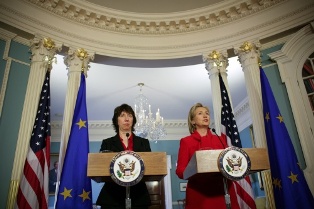Talks Between Iran and the EU Resume in November
October 15, 2010
Featured Image
Today's top nuclear policy stories, with excerpts in bullet form.
Stories we're following today: Friday October 15, 2010.
Iranian FM: Ready to Resume Nuclear Talks Soon - AP in The Washington Post [link]
- Iranian Foreign Minister Manouchehr Mottaki said on Friday that Tehran was ready to resume talks about its nuclear program with the international community within a matter of weeks.
- On Thursday, Catherine Ashton, the EU security and foreign affairs chief suggested the talks on Iran's nuclear program be held in Vienna "over three days in mid-November," with the participation of the United States, Britain, China, France, Russia and Germany.
- "Ashton hopes Mr. (Saeed) Jalili will respond positively and looks forward to constructively engaging with Iran next month," her spokesman Darren Ennis said, referring to Iran's top nuclear negotiator.
Pakistan to Push for Nuclear Deal With U.S. - Tom Wright in The Wall Street Journal [link]
- Pakistan officials say they will again raise their demand for a deal—similar to one the U.S. concluded with India—during a meeting Oct. 22 in Washington headed by U.S. Secretary of State Hillary Clinton and Pakistani Foreign Minister Shah Mahmood Qureshi.
- Pakistan's renewed push to clinch a civilian nuclear deal with Washington threatens to further strain relations that are already tense over Islamabad's refusal to attack Taliban havens on its soil.
- Islamabad views a civilian nuclear deal with the U.S. as a key compromise to show Pakistan is on a level with its rival India in the eyes of the U.S. Such a deal would assuage fears here that Washington has any intention of dismantling Pakistan's nuclear program.
- The U.S. views next week's "strategic dialogue" as key to getting Pakistan to move against militancy in return for billions of dollars in civilian and military aid. Help with civilian nuclear power, a role China currently fulfills, could help improve ties, some analysts say.
- Another Pakistani official said the delegation will raise the issue of a U.S. civilian nuclear deal next week but that "expectations are very low." The U.S., the Pakistani official said, "considers India its biggest ally. That's why our demand is rejected."
European Missile Shield Plan is Expected to Gain Support – Craig Whitlock in The Washington Post [link]
- U.S. and NATO officials said Thursday they expect that the military alliance will formally participate in the Obama administration's plan for a missile defense shield over Europe, scheduled to be activated next year
- NATO is scheduled to vote at a summit in Lisbon next month on whether to make missile defense a formal part of its mission. If it does, European alliance members would plug their individual defense systems into a broader missile shield that the Obama administration is building to guard against potential attacks from Iran.
- Although U.S. and NATO officials said they are close to a consensus on missile defense, there are still hurdles to overcome. Turkey, a NATO member and neighbor of Iran that would host a key anti-missile radar installation, has yet to commit.
- "I would say that we are not putting pressure on the Turks, but we are having continuing conversations with them as one of our allies," Gates said at a news conference in Brussels.
- Pentagon officials said they have been negotiating with other NATO allies in southern Europe to host the radar in case Turkey balks. One alternative is Bulgaria, which like Turkey borders the Black Sea but is farther from Iran.
Russia Agrees to Build Nuclear Plant in Venezuela - Associated Press
- Venezuelan President Hugo Chavez reached a deal with Russia on Friday to build a nuclear power plant in the South American country and negotiated several other agreements in energy and other areas.
- President Dmitry Medvedev said the nuclear deal would help Venezuela develop modern energy sources in addition to its hydrocarbon riches.
- "Our intentions are absolutely pure and open: we want our partner Venezuela to have a full range of energy possibilities," Medvedev said. "Even though the country is rich in oil and gas, it needs to develop new energy sources."
40 Under 40 – Time Magazine [link]
- Time Magazine has compiled a list of “a new generation of civic leaders," including Rachel Kleinfeld, CEO of the Truman National Security Project.
- Born and raised in a log cabin in Alaska, Kleinfeld, 34, started workshops for young progressives on national-security issues after watching John Kerry lose to George W. Bush in 2004. Her goal: to prove that Democrats can articulate strong and sensible alternatives to GOP defense policies.
- I would love for Truman Democrats to be as loud a voice in foreign policy as any major political movement, so I would say running a major political movement that affects the foreign policy of the nation.
- Note: The Truman National Security Project, a Ploughshares Fund grantee.



